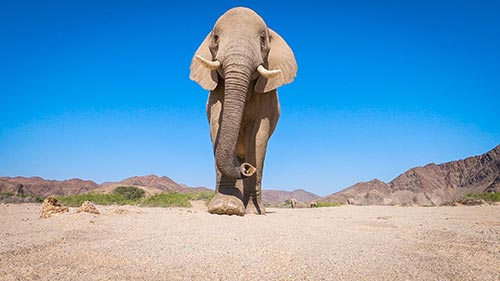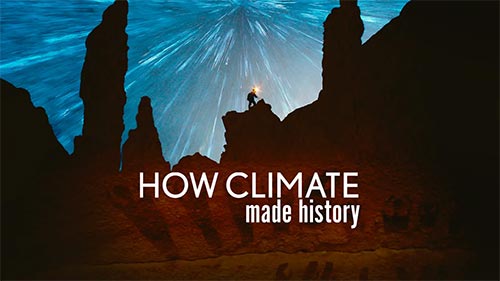Secrets of the Elephants
Channel: Disney+ / Nat Geo Wild (DStv 182 / StarSat 221)
TX Time: 00h01 / 18h45
Genre: Wildlife, Documentary Series

Elephants are powerful, loving and wise, but we are only starting to unlock their deepest secrets.
From filmmaker James Cameron, the series travels the world — from the Savannahs of Africa to the urban landscapes of Asia — to discover the strategic thinking, complex emotions and sophisticated language of elephants, shaping a unique and dynamic culture.
Narrated by Natalie Portman and featuring renowned National Geographic Explorer and elephant expert Dr. Paula Kahumbu, the four-part series not only reveals the extraordinary lives of different families of elephants but also highlights how similar they are to us.
Secrets of the Elephants will change everything you thought you knew about elephants forever.
Elephants have long been a source of wonder and mystery with their rich emotional lives and almost supernatural ways of navigating the world.
In Secrets of the Elephants, we travel the globe to meet different families of elephants - desert elephants, forest elephants, Asian elephants and African savannah elephants.
Each with their own specific set of cultural behaviours passed between them, has an incredible story of intelligence, grace and survival to tell.
They are powerful, loving and wise but only now are we starting to unlock the deepest Secrets of the Elephants.
Their strategic thinking, complex emotions and sophisticated language has created a unique and dynamic culture making them more like us than we ever thought possible.
The series that explores the courage, tenacity and complexities of elephant life in these unique contexts will land on Disney+, as well as in a special back-to-back broadcast on Nat Geo Wild, providing a larger-than-life viewing experience.
The four episodes – Desert, Savanna, Asia and Rainforest – will take families on a journey across the globe, providing insight into the fascinating creatures like never before.
Several National Geographic explorers collaborated on the research behind the production to uncover new dimensions of elephants' remarkable lives, to unlock their secret worlds and to understand how each sub-species has adapted to their unique environmental context in the face of evolving climate change.
Additionally, the latest science and camera technology helps portray not just how truly extraordinary they are in their own right, but also how similar they are to humans.
Desert
This episode reveals the secrets of Namibia's last remaining desert elephants.
When droughts, sandstorms and even floods threaten them, their shared knowledge passed down from generation to generation keeps them alive.
This is the toughest place on Earth to be an elephant, and their story is one of triumph in a land of extremes.
Savanna
Big families and strong relationships are the basis of success for savanna elephants.
As we uncover their secrets, we start to understand their remarkable language.
It's not just noise; they communicate like us.
Good leadership and close friendships help them through the hard times as they scale cliffs, find their place in the hierarchy and mourn their dead.
Asia
As humans encroach ever further into their environment, Asian elephants are learning to adjust to the challenges facing them.
They know how to use tools to break down electric fences, strike deals with farmers, and develop a cooperative arrangement on tea plantations where they do the weeding without damaging the crops.
Rainforest
The Congo rainforest is home to one of the world's most elusive species, the African forest elephant.
Everything about them — their bodies, their behaviours, their families — is adapted to life in the rainforest.
But surviving here means more than just adapting.
These elephants have shaped the forest around them to their needs and, in doing so, have created a habitat unlike any other on Earth.
How Climate Made History
Channel: Curiosity Channel (DStv 185)
TX Time: 19h00
Genre: Nature, Documentary Series

This two-part series presents some of the most spectacular discoveries of modern climatic research.
An international team comprising climatologists, historians and geologists has established that climate has played a crucial role in the development of historical events throughout central Europe.
This applies, among other things, to the rise of the Roman Empire, the vast migration of peoples between 400 and 700 A.D., Hannibal's journey across the Alps, the persecution of witches in the Middle Ages, and the 30 Years War.
This documentary presents the events in question and explains just how weather literally makes history.
The two-parter combines natural sciences and history, a journey from the Big Bang to Iceland's volcanoes – a narrative that explores little-known connections between the Earth's climate and major historical events.
Are these extremes of weather really a 21st-century phenomenon?
Or has climate determined the fate of humanity ever since amphibians took their first steps on terra firma?
Episode 1
Ever since the Big Bang, powerful forces have forged the conditions on Earth that have made life here possible.
In a single sequence, we travel through the millennia to witness the formation of our planet, its singular position in relation to the sun, the evolution of our continents and the birth of entire mountain chains.
And we learn how all of these elements combine to create Earth's constantly changing climate.
Homo sapiens emerge into this unpredictable and violent world, fighting for survival from the start.
It is these early humans' ability to adapt that allows them to triumph even in the face of incredible adversity.
The path for modern man is set at this early stage.
Episode 2
Is it possible that climate change could have kick-started the end of Antiquity?
When temperatures drop and the climate becomes drier, the Huns swarm Europe.
It's the last straw and brings about a mass migration that shakes the foundations of the Roman Empire.
They abandon cities like London – the ghost-towns of Antiquity.
But could this have been enough to herald the beginning of the Dark Ages that follow?
Historic sources from Byzantium right across to China have a different suggestion, now backed up by new scientific insights: around 536 AD, the Ilopango Volcano in Central America erupts.
The eruption is violent and propels ashes right up into the stratosphere.
The result: the sun dims to a blueish hue that struggles to break through the ash-layer.
The following 10 years are extraordinarily cold: this is the beginning of the dark middle ages, marked by famine, war and an almost complete loss of cultural heritage.